新初中英语语法知识—情态动词的知识点总复习有答案(2)
- 格式:doc
- 大小:39.00 KB
- 文档页数:7
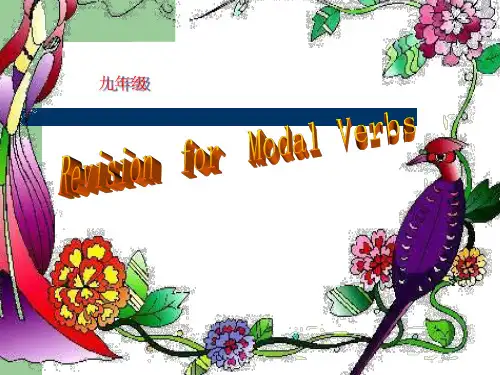
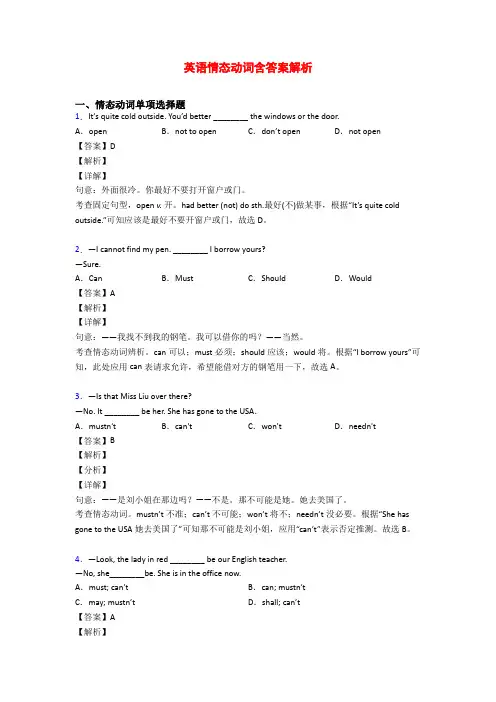
英语情态动词含答案解析一、情态动词单项选择题1.It’s quite cold outside. You’d better ________ the windows or the door.A.open B.not to open C.don’t open D.not open【答案】D【解析】【详解】句意:外面很冷。
你最好不要打开窗户或门。
考查固定句型,open v. 开。
had better (not) do sth.最好(不)做某事,根据“It’s quite cold outsi de.”可知应该是最好不要开窗户或门,故选D。
2.—I cannot find my pen. ________ I borrow yours?—Sure.A.Can B.Must C.Should D.Would【答案】A【解析】【详解】句意:——我找不到我的钢笔。
我可以借你的吗?——当然。
考查情态动词辨析。
can可以;must必须;should应该;would将。
根据“I borrow yours”可知,此处应用can表请求允许,希望能借对方的钢笔用一下,故选A。
3.—Is that Miss Liu over there?—No. It ________ be her. She has gone to the USA.A.mustn't B.can't C.won't D.needn't【答案】B【解析】【分析】【详解】句意:——是刘小姐在那边吗?——不是。
那不可能是她。
她去美国了。
考查情态动词。
mustn’t不准;can’t不可能;won’t将不;needn’t没必要。
根据“She has gone to the USA她去美国了”可知那不可能是刘小姐,应用“can’t”表示否定推测。
故选B。
4.—Look, the lady in red ________ be our English teacher.—No, she________be. She is in the office now.A.must; can’t B.can; mustn'tC.may; mustn’t D.shall; can’t【答案】A【解析】【详解】句意:——看,穿红衣服的那位女士一定是我们的英语老师。
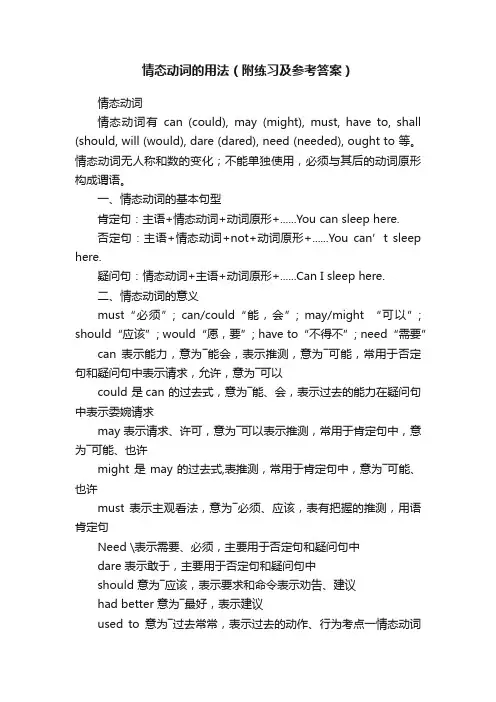
情态动词的用法(附练习及参考答案)情态动词情态动词有can (could), may (might), must, have to, shall (should, will (would), dare (dared), need (needed), ought to 等。
情态动词无人称和数的变化;不能单独使用,必须与其后的动词原形构成谓语。
一、情态动词的基本句型肯定句:主语+情态动词+动词原形+......You can sleep here.否定句:主语+情态动词+not+动词原形+......You can’t sleep here.疑问句:情态动词+主语+动词原形+......Can I sleep here.二、情态动词的意义must“必须”; can/could“能,会”; may/might “可以”; should“应该”; would“愿,要”; have to“不得不”; need“需要”can 表示能力,意为―能会,表示推测,意为―可能,常用于否定句和疑问句中表示请求,允许,意为―可以could 是can 的过去式,意为―能、会,表示过去的能力在疑问句中表示委婉请求may 表示请求、许可,意为―可以表示推测,常用于肯定句中,意为―可能、也许might 是may的过去式,表推测,常用于肯定句中,意为―可能、也许must 表示主观看法,意为―必须、应该,表有把握的推测,用语肯定句Need \表示需要、必须,主要用于否定句和疑问句中dare 表示敢于,主要用于否定句和疑问句中should 意为―应该,表示要求和命令表示劝告、建议had better 意为―最好,表示建议used to意为―过去常常,表示过去的动作、行为考点一情态动词情态动词有具体的词义,但也同助动词一样,需要与其他词语一起构成句子的谓语,另外情态动词没哟人称和数的变化,情态动词后必须跟动词原形。
三、情态动词的基本用法1. can 的用法(1)表示能力、许可、可能性。
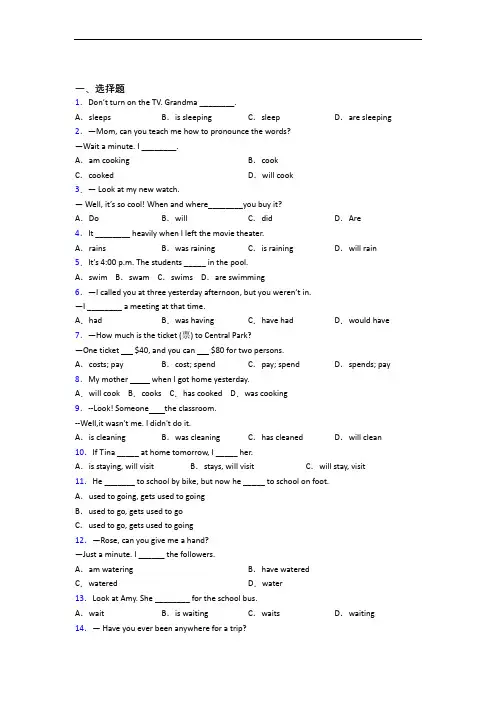
一、选择题1.Don’t turn on the TV. Grandma ________.A.sleeps B.is sleeping C.sleep D.are sleeping 2.—Mom, can you teach me how to pronounce the words?—Wait a minute. I ________.A.am cooking B.cookC.cooked D.will cook3.— Look at my new watch.—Well, it’s so cool! When and where________you buy it?A.Do B.will C.did D.Are4.It ________ heavily when I left the movie theater.A.rains B.was raining C.is raining D.will rain 5.It’s 4:00 p.m. The students _____ in the pool.A.swim B.swam C.swims D.are swimming6.—I called you at three yesterday afternoon, but you weren’t in.—I ________ a meeting at that time.A.had B.was having C.have had D.would have 7.—How much is the ticket (票) to Central Park?—One ticket $40, and you can $80 for two persons.A.costs; pay B.cost; spend C.pay; spend D.spends; pay 8.My mother when I got home yesterday.A.will cook B.cooks C.has cooked D.was cooking9.--Look! Someone the classroom.--Well,it wasn't me. I didn't do it.A.is cleaning B.was cleaning C.has cleaned D.will clean 10.If Tina _____ at home tomorrow, I _____ her.A.is staying, will visit B.stays, will visit C.will stay, visit 11.He _______ to school by bike, but now he _____ to school on foot.A.used to going, gets used to goingB.used to go, gets used to goC.used to go, gets used to going12.—Rose, can you give me a hand?—Just a minute. I ______ the followers.A.am watering B.have wateredC.watered D.water13.Look at Amy. She ________ for the school bus.A.wait B.is waiting C.waits D.waiting 14.— Have you ever been anywhere for a trip?— A trip? I ________ away from my hometown even once.A.went B.have gone C.have been D.have never been 15.The water ______ cool when I jumped into the pool for morning exercise.A.was felt B.is felt C.felt D.feels 16.While I_______ a detective story, someone_______ at the door.A.read, was knockingB.read, knockedC.was reading, knockedD.was reading, was knocking17.--What age did you leave home ?--I left home at 18. I ___your city for five yearsA.have gone to B.have been to C.have been in D.have come to 18.The film Operation Red Sea_____a lot of praise since its first show months ago. A.wins B.win C.will win D.has won 19.It’s 8 o’clock. The students _________ an English class.A.have B.having C.is having D.are having 20.—Did you hear the strange noise next door around 9 o’clock last night?— No, I ________my favourite film in my bedroom.A.watch B.watched C.am watching D.was watching 21.Don’t talk! The baby ________.A.sleeps B.is sleep C.sleeping D.is sleeping 22.— What do you use MP3 for?— I ________ it ________ to music.A.use; listen B.are listening; listeningC.use; to listen D.is listening; to listening23.My father was reading ________ I was sleeping.A.while B.when C.before D.after 24.Look! All my classmates ___________ on the playground.A.are running B.ran C.were running D.run25.—I can’t find Peter. Where is he?— He ______ tea in the living room.A.drinks B.drinking C.is drinking D.drink【参考答案】***试卷处理标记,请不要删除一、选择题1.B【解析】【分析】【详解】句意:别开电视,奶奶正在睡觉。
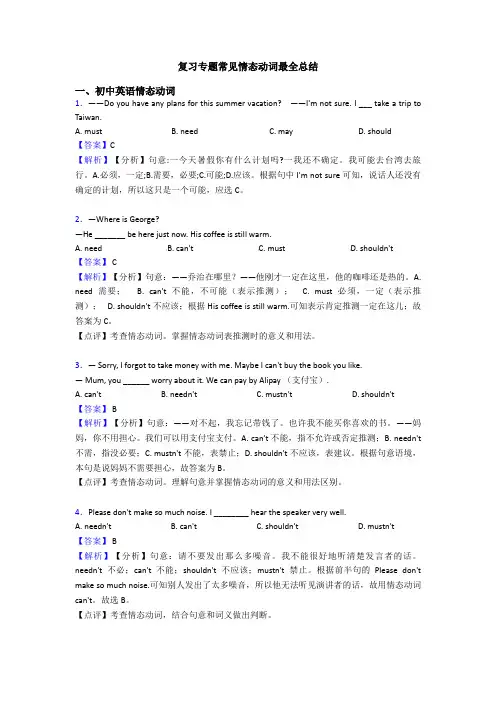
复习专题常见情态动词最全总结一、初中英语情态动词1.——Do you have any plans for this summer vacation? ——I'm not sure. I ___ take a trip to Taiwan.A. mustB. needC. mayD. should【答案】C【解析】【分析】句意:一今天暑假你有什么计划吗?一我还不确定。
我可能去台湾去旅行。
A.必须,一定;B.需要,必要;C.可能;D.应该。
根据句中I'm not sure可知,说话人还没有确定的计划,所以这只是一个可能,应选C。
2.—Where is George?—He _______ be here just now. His coffee is still warm.A. needB. can'tC. mustD. shouldn't【答案】 C【解析】【分析】句意:——乔治在哪里?——他刚才一定在这里,他的咖啡还是热的。
A. need需要; B. can't 不能,不可能(表示推测); C. must 必须,一定(表示推测); D. shouldn't不应该;根据His coffee is still warm.可知表示肯定推测一定在这儿;故答案为C。
【点评】考查情态动词。
掌握情态动词表推测时的意义和用法。
3.— Sorry, I forgot to take money with me. Maybe I can't buy the book you like.— Mum, you ______ worry about it. We can pay by Alipay (支付宝).A. can'tB. needn'tC. mustn'tD. shouldn't【答案】 B【解析】【分析】句意:——对不起,我忘记带钱了。
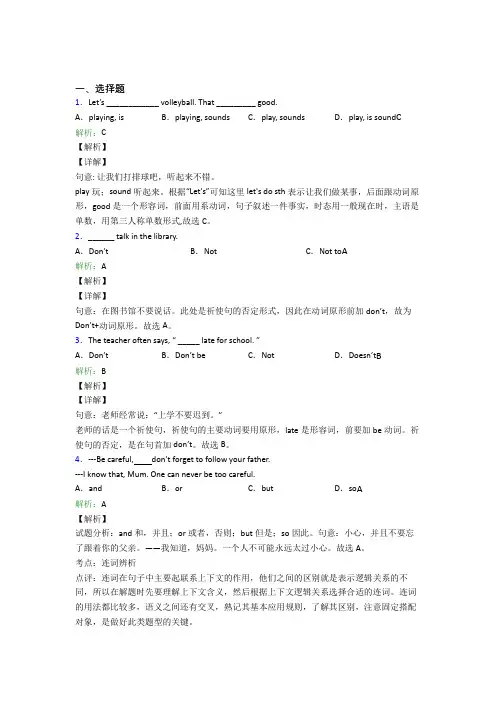
一、选择题1.Let’s ____________ volleyball. That _________ good.A.playing, is B.playing, sounds C.play, sounds D.play, is sound C解析:C【解析】【详解】句意: 让我们打排球吧,听起来不错。
play玩;sound听起来。
根据“Let's”可知这里let's do sth表示让我们做某事,后面跟动词原形,good是一个形容词,前面用系动词,句子叙述一件事实,时态用一般现在时,主语是单数,用第三人称单数形式,故选C。
2.______ talk in the library.A.Don’t B.Not C.Not to A解析:A【解析】【详解】句意:在图书馆不要说话。
此处是祈使句的否定形式,因此在动词原形前加don’t,故为Don’t+动词原形。
故选A。
3.The teacher often says, “ _____ late for school. ”A.Don’t B.Don’t be C.Not D.Doesn’t B解析:B【解析】【详解】句意:老师经常说:“上学不要迟到。
”老师的话是一个祈使句,祈使句的主要动词要用原形,late是形容词,前要加be动词。
祈使句的否定,是在句首加don’t。
故选B。
4.---Be careful, don’t forget to follow your father.---I know that, Mum. One can never be too careful.A.and B.or C.but D.so A解析:A【解析】试题分析:and和,并且;or或者,否则;but但是;so因此。
句意:小心,并且不要忘了跟着你的父亲。
——我知道,妈妈。
一个人不可能永远太过小心。
故选A。
考点:连词辨析点评:连词在句子中主要起联系上下文的作用,他们之间的区别就是表示逻辑关系的不同,所以在解题时先要理解上下文含义,然后根据上下文逻辑关系选择合适的连词。
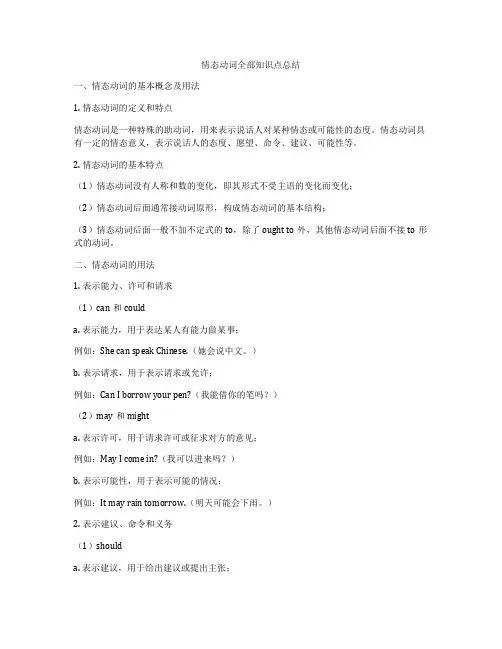
情态动词全部知识点总结一、情态动词的基本概念及用法1. 情态动词的定义和特点情态动词是一种特殊的助动词,用来表示说话人对某种情态或可能性的态度。
情态动词具有一定的情态意义,表示说话人的态度、愿望、命令、建议、可能性等。
2. 情态动词的基本特点(1)情态动词没有人称和数的变化,即其形式不受主语的变化而变化;(2)情态动词后面通常接动词原形,构成情态动词的基本结构;(3)情态动词后面一般不加不定式的to,除了ought to外,其他情态动词后面不接to形式的动词。
二、情态动词的用法1. 表示能力、许可和请求(1)can和coulda. 表示能力,用于表达某人有能力做某事;例如:She can speak Chinese.(她会说中文。
)b. 表示请求,用于表示请求或允许;例如:Can I borrow your pen?(我能借你的笔吗?)(2)may和mighta. 表示许可,用于请求许可或征求对方的意见;例如:May I come in?(我可以进来吗?)b. 表示可能性,用于表示可能的情况;例如:It may rain tomorrow.(明天可能会下雨。
)2. 表示建议、命令和义务(1)shoulda. 表示建议,用于给出建议或提出主张;例如:You should see a doctor.(你应该去看医生。
)b. 表示义务,用于表示责任或义务;例如:We should obey the law.(我们应该遵守法律。
)(2)ought toa. 表示责任或义务,用于表示应该做的事情;例如:You ought to apologize to her.(你应该向她道歉。
)3. 表示可能性和必然性(1)musta. 表示必然性,用于表示肯定的推断或必然的结论;例如:He must be at home now.(他现在一定在家。
)b. 表示义务,用于表示应遵守的规定或责任;例如:Students must wear school uniforms.(学生必须穿校服。
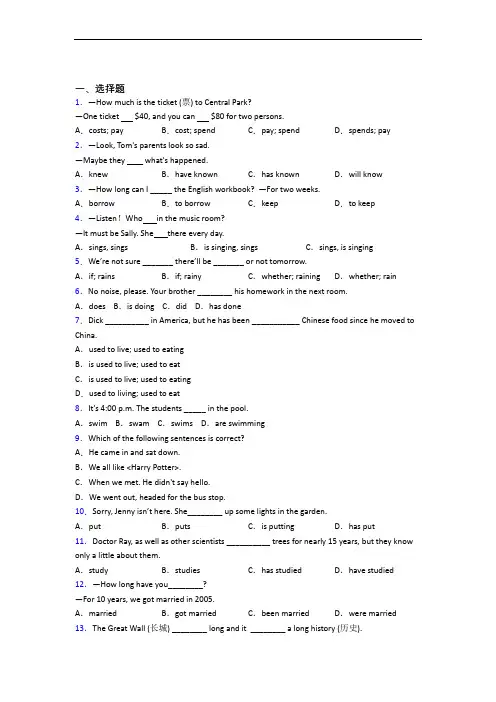
一、选择题1.—How much is the ticket (票) to Central Park?—One ticket $40, and you can $80 for two persons.A.costs; pay B.cost; spend C.pay; spend D.spends; pay 2.—Look, Tom's parents look so sad.—Maybe they what's happened.A.knew B.have known C.has known D.will know 3.—How long can I _____ the English workbook? —For two weeks.A.borrow B.to borrow C.keep D.to keep 4.—Listen!Who in the music room?—It must be Sally. She there every day.A.sings, sings B.is singing, sings C.sings, is singing5.We’re not sure _______ there’ll be _______ or not tomorrow.A.if; rains B.if; rainy C.whether; raining D.whether; rain 6.No noise, please. Your brother ________ his homework in the next room.A.does B.is doing C.did D.has done7.Dick __________ in America, but he has been ___________ Chinese food since he moved to China.A.used to live; used to eatingB.is used to live; used to eatC.is used to live; used to eatingD.used to living; used to eat8.It’s 4:00 p.m. The students _____ in the pool.A.swim B.swam C.swims D.are swimming9.Which of the following sentences is correct?A.He came in and sat down.B.We all like <Harry Potter>.C.When we met. He didn't say hello.D.We went out, headed for the bus stop.10.Sorry, Jen ny isn’t here. She________ up some lights in the garden.A.put B.puts C.is putting D.has put 11.Doctor Ray, as well as other scientists __________ trees for nearly 15 years, but they know only a little about them.A.study B.studies C.has studied D.have studied 12.—How long have you________?—For 10 years, we got married in 2005.A.married B.got married C.been married D.were married 13.The Great Wall (长城) ________ long and it ________ a long history (历史).A.has; is B.is; is C.is; has D.have; has 14.----Can you tell me how long you_______ the Huawei mobile phone,Mr. Zhang.----Nearly a year. It works very well.A.will buy B.have had C.have bought D.had had15.--Look! Someone the classroom.--Well,it wasn't me. I didn't do it.A.is cleaning B.was cleaning C.has cleaned D.will clean 16.He _______ to school by bike, but now he _____ to school on foot.A.used to going, gets used to goingB.used to go, gets used to goC.used to go, gets used to going17.Look! Dave __________ on the phone.A.talks B.are talking C.talk D.is talking 18.Don’t turn on the TV. Grandma ________.A.sleeps B.is sleeping C.sleep D.are sleeping 19.We were in Qingdao last spring and _______ great fun there.A.is having B.are having C.had D.have 20.It’s 8 o’clock. The students _________ an English class.A.have B.having C.is having D.are having 21.—Did you hear the strange noise next door around 9 o’clock last night?— No, I ________my favourite film in my bedroom.A.watch B.watched C.am watching D.was watching 22.—How did the accident happen?—You know, it was difficult to see the road clearly because it________.A.was raining B.has rained C.is raining D.will rain 23.Sandy likes ________ TV. She ________ TV every day.A.watching; watching B.watch; watchesC.to watch; is watching D.watching; watches24.My father is a teacher and he ___________ in this school for about twenty years. A.works B.is working C.was working D.has worked 25.—I called you at three yesterday afternoon, but you weren’t in.—I ________ a meeting at that time.A.had B.was having C.have had D.would have 【参考答案】***试卷处理标记,请不要删除一、选择题1.A解析:A【解析】【分析】【详解】句意:——中央公园的门票多少钱?——一张票是40美元,两个人你需要支付80美元。
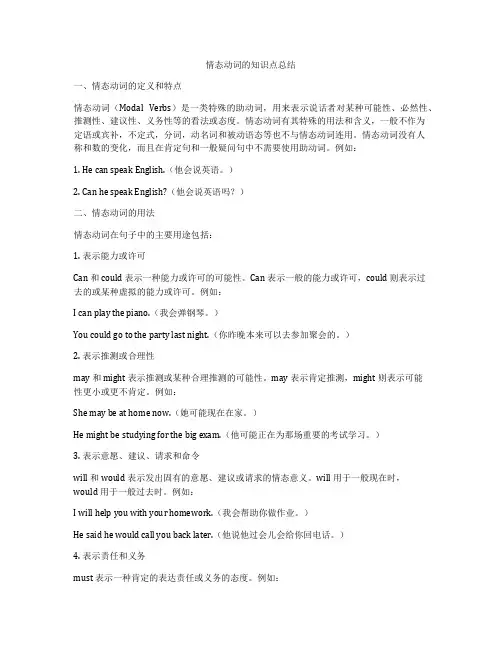
情态动词的知识点总结一、情态动词的定义和特点情态动词(Modal Verbs)是一类特殊的助动词,用来表示说话者对某种可能性、必然性、推测性、建议性、义务性等的看法或态度。
情态动词有其特殊的用法和含义,一般不作为定语或宾补,不定式,分词,动名词和被动语态等也不与情态动词连用。
情态动词没有人称和数的变化,而且在肯定句和一般疑问句中不需要使用助动词。
例如:1. He can speak English.(他会说英语。
)2. Can he speak English?(他会说英语吗?)二、情态动词的用法情态动词在句子中的主要用途包括:1. 表示能力或许可Can 和 could 表示一种能力或许可的可能性。
Can 表示一般的能力或许可,could 则表示过去的或某种虚拟的能力或许可。
例如:I can play the piano.(我会弹钢琴。
)You could go to the party last night.(你昨晚本来可以去参加聚会的。
)2. 表示推测或合理性may 和 might 表示推测或某种合理推测的可能性。
may 表示肯定推测,might 则表示可能性更小或更不肯定。
例如:She may be at home now.(她可能现在在家。
)He might be studying for the big exam.(他可能正在为那场重要的考试学习。
)3. 表示意愿、建议、请求和命令will 和 would 表示发出固有的意愿、建议或请求的情态意义。
will 用于一般现在时,would 用于一般过去时。
例如:I will help you with your homework.(我会帮助你做作业。
)He said he would call you back later.(他说他过会儿会给你回电话。
)4. 表示责任和义务must 表示一种肯定的表达责任或义务的态度。
例如:You must complete the task by tomorrow.(你必须在明天前完成任务。
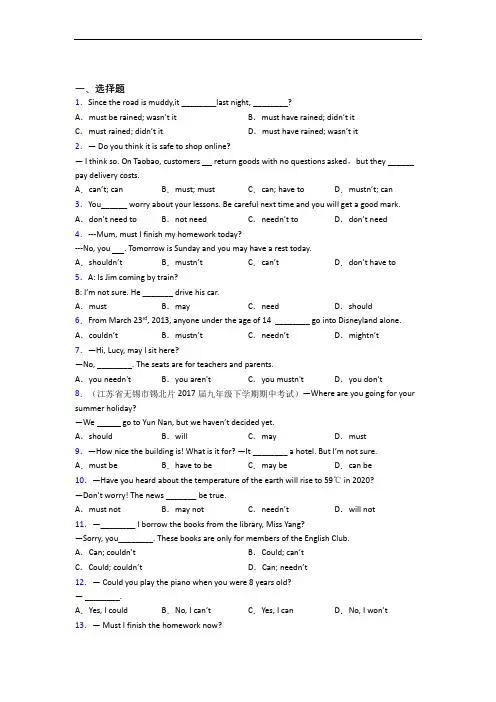
一、选择题1.Since the road is muddy,it ________last night, ________?A.must be rained; wasn’t it B.must have rained; didn’t itC.must rained; didn’t it D.must have rained; wasn’t it2.— Do you think it is safe to shop online?— I think so. On Taobao, customers return goods with no questions asked,but they ______ pay delivery costs.A.can’t; can B.must; must C.can; have to D.mustn’t; can 3.You______ worry about your lessons. Be careful next time and you will get a good mark. A.don’t need to B.not need C.needn’t to D.don’t need4.---Mum, must I finish my homework today?---No, you . Tomorrow is Sunday and you may have a rest today.A.shouldn’t B.mustn’t C.can’t D.don’t have to 5.A: Is Jim coming by train?B: I’m not sure. He _______ drive his car.A.must B.may C.need D.should6.From March 23rd, 2013, anyone under the age of 14 ________ go into Disneyland alone. A.couldn’t B.mustn’t C.needn’t D.mightn’t 7.—Hi, Lucy, may I sit here?—No, ________. The seats are for teachers and parents.A.you needn't B.you aren't C.you mustn't D.you don't 8.(江苏省无锡市锡北片2017届九年级下学期期中考试)—Where are you going for your summer holiday?—We go to Yun Nan, but we haven’t decided yet.A.should B.will C.may D.must9.—How nice the building is! What is it for? —It ________ a hotel. But I’m not sure. A.must be B.have to be C.may be D.can be 10.—Have you heard about the temperature of the earth will rise to 59℃ in 2020?—Don’t worry! The news _______ be true.A.must not B.may not C.needn’t D.will not 11.—________ I borrow the books from the library, Miss Yang?—Sorry, you________. These books are only for members of the English Club.A.Can; couldn’t B.Could; can’tC.Could; couldn’t D.Can; needn’t12.— Could you play the piano when you were 8 years old?— ________.A.Yes, I could B.No, I can’t C.Yes, I can D.No, I won’t 13.— Must I finish the homework now?— .You can do it later.A.No, you needn’t B.Yes, you must C.No, you can’t14.-_________ you help me with my homework?-Of course if I __________.A.Could; could B.Can't; can C.Could; can D.Can; could 15.— Must I go home? — No, you ________.A.can’t B.mustn’t C.don’t D.needn’t 16.–Is Mike coming to the fashion show tomorrow?--I’m not sure. He ______ not come.A.must B.can C.may D.should 17.(2017 • 湖北省宜昌市中考)—Life is becoming convenient with the Internet.—That’s true! Almost everything be done online.A.must B.would C.should D.can 18.—Must I hand in my reports today?—No, you ________.A.mustn’t B.can’t C.shouldn’t D.don’t have to 19.---You look very pretty, if I say so.---Thanks a lot for saying that.A.must B.may C.will D.have to 20.—I often see Maria in the library, and she _________ like reading best.—That’s right.A.need B.may C.must D.can 21.—Could I call you by the first name?—Yes, you .A.will B.could C.may D.might 22.You __ drive your car so fast. It's very dangerous.A.wouldn't B.shouldn't C.couldn't D.mightn't【参考答案】***试卷处理标记,请不要删除一、选择题1.B解析:B【解析】【分析】【详解】句意:由于道路泥泞,昨晚一定下雨了,是吗?考查情态动词表推测以及反意疑问句。
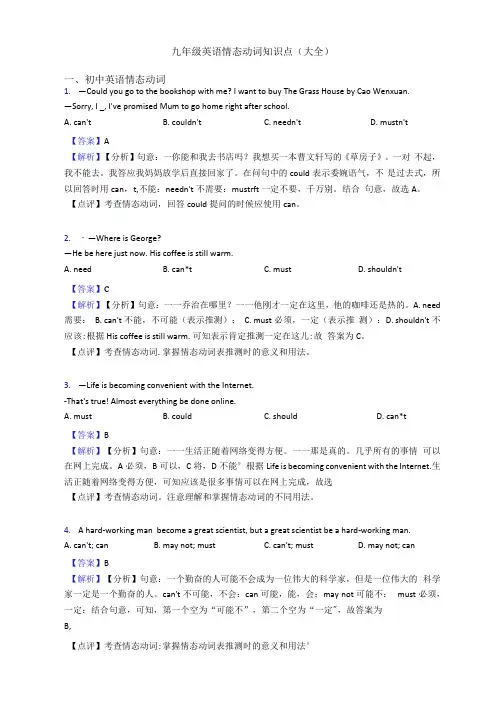
九年级英语情态动词知识点(大全)一、初中英语情态动词1.—Could you go to the bookshop with me? I want to buy The Grass House by Cao Wenxuan. —Sorry, I _, I've promised Mum to go home right after school.A. can'tB. couldn'tC. needn'tD. mustn't【答案】A【解析】【分析】句意:一你能和我去书店吗?我想买一本曹文轩写的《草房子》。
一对不起,我不能去。
我答应我妈妈放学后直接回家了。
在问句中的could表示委婉语气,不是过去式,所以回答时用can,t,不能:needn't不需要:mustrft一定不要,千万别。
结合句意,故选A。
【点评】考查情态动词,回答could提问的时候应使用can。
2.・—Where is George?—He be here just now. His coffee is still warm.A. needB. can*tC. mustD. shouldn't【答案】c【解析】【分析】句意:一一乔治在哪里?一一他刚才一定在这里,他的咖啡还是热的。
A. need 需要:B. can't不能,不可能(表示推测);C. must必须,一定(表示推测):D. shouldn't不应该:根据His coffee is still warm.可知表示肯定推测一定在这儿:故答案为C。
【点评】考查情态动词.掌握情态动词表推测时的意义和用法。
3.—Life is becoming convenient with the Internet.-That's true! Almost everything be done online.A. mustB. couldC. shouldD. can*t【答案】B【解析】【分析】句意:一一生活正随着网络变得方便。
情态动词英语语法知识点汇总情态动词(Modal verbs)本⾝有⼀定的词义,表⽰语⽓的单词。
但是不能独⽴作谓语,只能和动词原形⼀起构成谓语。
!以下是店铺为⼤家编辑的情态动词英语语法知识点汇总,希望⼤家喜欢。
1 情态动词的语法特征1) 情态动词不能表⽰正在发⽣或已经发⽣的事情,只表⽰期待或估计某事的发⽣。
2) 情态动词除ought 和have 外,后⾯只能接不带to 的不定式。
3) 情态动词没有⼈称,数的变化,即情态动词第三⼈称单数不加-s。
4) 情态动词没有⾮谓语形式,即没有不定式,分词,等形式。
1 情态动词的语法特征1) 情态动词不能表⽰正在发⽣或已经发⽣的事情,只表⽰期待或估计某事的发⽣。
2) 情态动词除ought 和have 外,后⾯只能接不带to 的不定式。
3) 情态动词没有⼈称,数的变化,即情态动词第三⼈称单数不加-s。
4) 情态动词没有⾮谓语形式,即没有不定式,分词,等形式。
2 ⽐较can 和be able to1)can could 表⽰能⼒;可能 (过去时⽤could),只⽤于现在式和过去式(could)。
be able to可以⽤于各种时态。
They will be able to tell you the news soon. 他很快就能告诉你消息了。
2)只⽤be able toa. 位于助动词后。
b. 情态动词后。
c. 表⽰过去某时刻动作时。
d. ⽤于句⾸表⽰条件。
e. 表⽰成功地做了某事时,只能⽤was/were able to,不能⽤could。
He was able to flee Europe before the war broke out.= He managed to flee Europe before the war broke out.注意:could不表⽰时态1)提出委婉的请求,(注意在回答中不可⽤could)。
--- Could I have the television on?--- Yes, you can. / No, you can't.2)在否定,疑问句中表⽰推测或怀疑。
一、选择题1.It’s _______today.I think it’s going to________.A.cloud,rainB.cloudy,rainingC.cloudy,rainD.cloudy,rainy2.Mr Hua ________ to Japan. He’ll come back in two weeks.A.goes B.went C.has gone D.will go 3.—Listen!Who in the music room?—It must be Sally. She there every day.A.sings, sings B.is singing, sings C.sings, is singing 4.—Surprise! Cindy is singing in the concert.—But she ______.A.will refuse B.refusedC.refuses D.has refuse5.Miss Brown, we ______ cleaning our classroom. Can we go home now?A.finish B.finishingC.are finished D.have finished6.—Mom, can you teach me how to pronounce the words?—Wait a minute. I ________.A.am cooking B.cookC.cooked D.will cook7.— Look at my new watch.—Well, it’s so cool! When and where________you buy it?A.Do B.will C.did D.Are 8.—________ a remake (翻拍) of the famous Disney movie Lion King in July, 2019.— Really? I can't wait to see it.A.There will have B.There is going to have C.There will be 9.—I called you at three yesterday afterno on, but you weren’t in.—I ________ a meeting at that time.A.had B.was having C.have had D.would have 10.—I'm sorry. There was too much traffic on the road.—Never mind. The meeting________for only 5 minutes.A.has begun B.has stopped C.has been on 11.They the English role play for the show last night.A.will practice B.practiced C.is practicing D.have practiced12.—How long have you________?—For 10 years, we got married in 2005.A.married B.got married C.been married D.were married 13.—Did you see a man in black pass by just now?—No, sir. I a newspaper.A.read B.was reading C.would read D.am reading 14.Though the number of family cars ________ growing in most cities, the bicycle is still a popular way of going to school or work.A.are B.is C.were D.was 15.Look at Amy. She ________ for the school bus.A.wait B.is waiting C.waits D.waiting 16.Don’t turn on the TV. Grandma ________.A.sleeps B.is sleeping C.sleep D.are sleeping 17.The water ______ cool when I jumped into the pool for morning exercise.A.was felt B.is felt C.felt D.feels 18.While I_______ a detective story, someone_______ at the door.A.read, was knockingB.read, knockedC.was reading, knockedD.was reading, was knocking19.---Where have you been recently?---I _______ in Hangzhou on business for a week last month.A.have been B.had gone C.had been D.was 20.— Mum, where is Dad?— He _________ flowers in the garden now.A.planted B.plants C.will plant D.is planting 21.—How did the accident happen?—You know, it was difficult to see the road clearly because it________.A.was raining B.has rained C.is raining D.will rain 22.With a book in his hand, the boy ________ in bed.A.lie B.lied C.lay D.lying 23.Sandy likes ________ TV. She ________ TV every day.A.watching; watching B.watch; watchesC.to watch; is watching D.watching; watches24.— What do you use MP3 for?— I ________ it ________ to music.A.use; listen B.are listening; listeningC.use; to listen D.is listening; to listening25.— Could you please tell me yesterday?— In the bookshop nearby.A.Where you bought the book B.Where you buy the bookC.Where did you buy the book D.Where do you buy the book【参考答案】***试卷处理标记,请不要删除一、选择题1.C解析:C【解析】【详解】句意:今天阴天,我想要下雨了。
初中英语情态动词详细用法归纳〔含练习及答案〕情态动词有具体的词义,但也同助动词一样,需要与其他词语一起构成句子的谓语,另外情态动词没有人称和数的变化,情态动词后必须跟动词原形。
考点一: can , may , must 等情态动词在陈述句中的用法: 1. can 的用法:〔 1〕.表示能力、许可、可能性。
表示能力时一般译为“能、会 〞, 即有种能力,尤其是生来具备的能力 .如: She can swim fast, but I can 她’能t.游得很快,但我不能。
I can see with my eyes. 我用眼睛看。
could 是 can 的过去式。
表示过去的能力。
be able to do sth. 常常指经过努力,花费了时间和劳力之后才能做到某事。
is/am/are able to do sthwas/were able to do sth.( 2〕 .表示许可,常在口语中。
如: You can use my dictionary.你可以用我的字典。
〔 3〕.表示推测, 可能性,意为“可能 〞,常用于否认句和疑问句中,此时 can ’t 译为 “ 不可能 〞。
如: Can the news be true? 这个消息会是真的吗?— Can it be our teacher?那个人有可能是我们教师吗?— No, it can ’ t be our teacher. He is on a visit to the Great Wall 不可.能。
咱们教师正在游览长城呢。
【例题】— I think Miss Gao must be in the library. She said she would go there.— No. She __be there, I have just been there.A.can ’ tB.mustn ’ tC.needn ’ tD.wouldn ’t“我刚去过那儿 〞可知,应为 “不可能〞, can ’t 表示推测 [ 答案 ] A( 1〕.can 的过去式, 意为“能、 会〞,表示过去的能力。
一、选择题1.Tom and Jim __________ in Class 3.A.is B.be C.am D.are2.Many students are so crazy about mobile games that they lose interest in their schoolwork, which _________ their parents and teachers a lot.A.worries about B.is worried about C.worries D.is worried 3.—Do you like watching cooking programs on TV?—No, I don’t , but my twin brother . He's very fond of cooking.A.does B.do C.is D.are4.The strawberries delicious. You can have a try.A.eat B.drink C.taste D.sound5.The teacher's smile made me ________ better.A.feel B.to feel C.feeling D.felt6.Ted likes Art, his brother .A.but; isn't B.and; don't C.but; doesn't D.but ;don't 7.Lucy and I ________ good friends.A.am B.is C.are8.________he_______big________?A.Does; has; foot B.Does; have; feet C.Do; have; foots 9.Speak louder, ________ you can’t make yourself________.A.and; hear B.or; hear C.and; heard D.or; heard 10.— What kind of home do you ? — A flat three bedrooms.A.live in; with B.live; with C.live in; has D.live; has 11.This my sister and those my brothers.A.is, is B.are, are C.is, are12.Hard work can bring you , but if you are lazy, you won’t become . A.success; success B.successful; successC.success; successful D.successful; succeed13.Alice, it's time for school. Let me _______, or I will be late for class.A.go B.come C.to go D.to come 14.—How much ________ this pair of socks?—Two dollars for one pair.A.am B.is C.are15.Li Ming's father __________want __________the new coat.A.doesn't; buy B.don't; to buy C.don't; buy D.doesn't; to buy 16.— When and where shall we meet?— Let's ________it half past nine.A.meet B.make C.do17.Our teachers always make us ________ a lot of homework.A.to do B.do C.does D.doing18.— How ________ your trip to Australia?—Great. I’ll go there again next year.A.was B.is C.are D.were 19.Nothing ______ difficult if you put your heart into it.A.is B.are C.am D.Be20.Let’s_________ and play football.A.go B.to go C.going21.The air _______ fresh after the rain. And the sky is blue.A.feels B.tastes C.smells D.sounds 22.Mike and Jeff________ TV on weekdays.A.doesn't watch B.don't watch C.watches D.not watch 23.Tom and I ________ good friends. He is twelve(12岁).A.are B.am C.is D.be24.________your brother________ a baseball?A.Do; have B.Does; has C.Does; have D.Do; has 25.—Do you know whom they will have ________the parts of car together?—Sorry,I have no idea.A.fix B.fixed C.to fix D.fixing【参考答案】***试卷处理标记,请不要删除一、选择题1.D解析:D【解析】【分析】【详解】句意:汤姆和吉姆都在3班。
一、选择题1.—Jenny, we buy Mom presents. We can clean the house from top to bottom.—Good idea! It’s a special present for Mother’s Day.A.can’t B.mustn’tC.shouldn’t D.needn’t2.—Have you heard about the temperature of the earth will rise to 59℃ in 2020?—Don’t worry! The news _______ be true.A.must not B.may not C.needn’t D.will not 3.—I’d like ________ Guo Jingming’s Tiny Times.—You had better________ his books. The stories he tells are far from real life.A.buying, don’t read B.to buy, not readC.buying, not read D.to buy, not to read4.You run with the train when it is coming. It’s dangerous.A.may not B.mustn’t C.needn’t5.You have finished most of the work, so you ____ start working so early tomorrow. You may come at 9 :00.A.can't B.mustn't C.needn't D.couldn't 6.Since you are very tired, you ______ finish the work today.A.needn’t B.may not C.mustn’t D.can’t7.All passengers_____ go through safety check before they take a plane.A.may B.can C.must D.need 8.—Can I take some milk and biscuits to the reading room?—No, our school has a rule that students _______ eat or drink there.A.can’t B.mustn’t C.needn’t D.may not 9.You __ drive your car so fast. It's very dangerous.A.wouldn't B.shouldn't C.couldn't D.mightn't 10.—Must I finish my homework this evening?—No,you ________.You have a three﹣day holiday.A.won't B.mustn't C.needn't11.I see the blackboard. I need to have my glasses.A.can B.can’t C.must D.mustn’t 12.—We've prepared all kinds of foods for the picnic.—Do you mean I___ bring anything?A.can't B.needn't C.mustn't D.won't 13.—Jack must be in his office, I think.—No, he be in the office. He flew to Canada this morning.A.needn't B.shouldn't C.can't D.mustn't 14.(2017·甘肃白银·10)—I wonder if these are Danny's glasses.—They________be Danny's. He doesn't wear glasses.A.can't B.must C.mustn't D.can15.The flowers ________ every day, or they will die.A.must water B.can be wateredC.should water D.must be watered16.Everyone______ be polite to their parents.A.could B.may C.should D.can17.When I write down what I am showing thanks to, it’s always for things that money______buy.A.needn’t B.shouldn’t C.may not D.can’t18.— Must I go home? — No, you ________.A.can’t B.mustn’t C.don’t D.needn’t 19.—Mum, I’ve signed for a big box by Future Express (快递). What’s in it?—I’m not sure. It ________be a present from your brother.A.need B.must C.may D.will 20.(2017 • 湖北省宜昌市中考)—Life is becoming convenient with the Internet.—That’s true! Almost everything be done online.A.must B.would C.should D.can 21.—Could you help me download some Taylor Swift’s songs from Ku Gou?—Sorry, people download music from the Internet without paying, because it’s against the law. A.wouldn’t B.needn’tC.mustn’t D.couldn’t22.The milk tas tes bad. You’d better_______.A.throw it away B.to throw it awayC.throw them away D.to throw them away【参考答案】***试卷处理标记,请不要删除一、选择题1.D解析:D【解析】【分析】【详解】句意:——Jenny,我们不需要给母亲买礼物,我们可以从上到下打扫房子。
(完整版)情态动词知识点总结什么是情态动词情态动词(Modal verb)是一种特殊的动词形式,用来表示说话人对某种行为、情况或可能性的态度、观点、意愿、能力等。
情态动词可以用来构成陈述句、疑问句、否定句、建议句等。
常用的情态动词及其用法1. Can:表示能力、许可、可能性、请求等。
Can:表示能力、许可、可能性、请求等。
- 表示能力:I can swim.(我会游泳。
)- 表示许可:Can I use your phone?(我可以用一下你的手机吗?)- 表示可能性:He can be late.(他可能会迟到。
)- 表示请求:Can you help me?(你能帮我吗?)2. Could:表示过去的能力、请求、建议等。
Could:表示过去的能力、请求、建议等。
- 表示过去的能力:When I was young, I could run faster.(我年轻的时候,跑得更快。
)- 表示请求:Could you please pass me the salt?(你能给我递一下盐吗?)- 表示建议:You could try using a different approach.(你可以尝试用一种不同的方法。
)3. May:表示可能性、许可、祝愿等。
May:表示可能性、许可、祝愿等。
- 表示可能性:It may rain tomorrow.(明天可能会下雨。
)- 表示许可:May I use your bathroom?(我可以使用你的卫生间吗?)- 表示祝愿:May you have a happy birthday!(祝你生日快乐!)4. Might:表示可能性、建议、推测等。
Might:表示可能性、建议、推测等。
- 表示可能性:She might be at home.(她可能在家。
)- 表示建议:You might want to consider another option.(你可以考虑另一个选项。
一、选择题1.—Can you come to my party on Saturday afternoon?—Sorry, I can’t. I ________ meet my friends.A.can’t B.might have to C.needn’t2.—I’d like ________ Guo Jingming’s Tiny Times.—You had better________ his books. The stories he tells are far from real life. A.buying, don’t read B.to buy, not readC.buying, not read D.to buy, not to read3.—Must I finish the work today, Mum?—No, you ________.You can finish it tomorrow.A.mustn't B.can't C.shouldn't D.needn't 4.Look at the sign! It says “No Smoking!”You ________ smoke here. It’s dangerous. A.mustn’t B.ought not to C.needn’t D.don’t have to 5.―I didn’t pass the driving test again.―Don't worry. Just like the weather, life be beautiful all the time.A.can't B.needn't C.shouldn't D.mustn't 6.I’ve bought a nice necklace for Jo’s birthday. She _____like it, but I’m not sure.A.can B.may be C.might D.must 7.—Is Wendy in the classroom now?—I’m not sure. She ________ be there. I saw her in the library ten minutes ago.A.may not B.must not C.shall not D.would not 8.—Jenny, you _________ push your way onto the bus.—I’m really sorry about it.A.mustn’t B.needn’t C.may not9.From March 23rd, 2013, anyone under the age of 14 ________ go into Disneyland alone. A.couldn’t B.mustn’t C.needn’t D.mightn’t 10.— I wonder if these are Jim's glasses.—They _____his. He doesn't wear glasses.A.might be B.could be C.can't be11.The milk tastes bad. You’d better_______.A.throw it away B.to throw it awayC.throw them away D.to throw them away12.-Mum, must I stay there the whole day?-No, you__________. You__________ come back after lunch, if you like.A.mustn’t; can B.needn’t; must C.needn’t; may 13.— May I have some wine?— No, you . You have to drive home later.A.shouldn't B.needn't C.mustn't D.may not14.Since the road is muddy,it ________last night, ________?A.must be rained; wasn’t it B.must have rained; didn’t itC.must rained; didn’t it D.must have rained; wasn’t it 15.—Must I start now?—No, you_______________.A.mustn't B.can't C.needn't D.must16.I t’s raining all day, so I ________ stay at home.A.can’t B.has to C.have to 17.Everyone______ be polite to their parents.A.could B.may C.should D.can18.---I heard they went skating in the mountains last winter.---It ______ true because there was little snow there.A.may not be B.won’t be C.couldn’t be D.will be 19.—We've prepared all kinds of foods for the picnic.—Do you mean I___ bring anything?A.can't B.needn't C.mustn't D.won't20.—________ David be the new chairperson of the Students’ Union?—He _______ be, but I’m not sure.A.Can; can’t B.Can; mayC.May; must D.May; mustn’t21.—Could I call you by the first name?—Yes, you .A.will B.could C.may D.might 22.—Can I take some milk and biscuits to the reading room?—No, our school has a rule that students _______ eat or drink there.A.can’t B.mustn’t C.needn’t D.may not【参考答案】***试卷处理标记,请不要删除一、选择题1.B解析:B【解析】【分析】【详解】句意:——星期六下午你能来参加我的派对吗?——抱歉,我不能。
我可能不得不见我的朋友。
考查情态动词。
can’t 不能;might可能,have to不得不;needn’t不需要。
根据句意空格处必须是肯定的。
可知,此处表示“我可能不得不见朋友。
”所以去不了派对,故用might have to,故选B。
2.B解析:B【解析】【详解】句意:——我想买郭敬明的《小时代》。
——你最好不要读他的书。
他讲的故事与现实生活相去甚远。
考查非谓语动词及固定句型。
短语would like to do sth.愿意去做某事;第一空排除AC;You had better+动词原形,你最好做某事;You had better not+动词原形,你最好不要做某事。
第二空排除D。
根据题意,故选B。
3.D解析:D【解析】【详解】句意:-我必须今天做完这个工作吗,妈妈?-不,你不必。
你可以明天完成。
mustn’t禁止,不要;can’t不能,不会;shouldn’t不应该;needn’t不必,没有必要。
Must 的一般疑问句,肯定回答用must,否定回答应用needn’t。
故选D。
4.A解析:A【解析】【分析】【详解】句意:看这个标志!上面写道“禁止吸烟!“你不能抽烟。
这是危险的。
mustn’t 禁止,不允许;ought not to不应该,不应当;needn’t不必;don’t have to不必。
根据“No Smoking!”可知此处禁止吸烟,所以选A。
5.A解析:A【解析】【详解】句意:——我驾照考试又失败了。
——别担心。
就像天气一样,生活也不可能一直是美丽的。
考查情态动词。
can't不可能;needn't不必;shouldn't不应该;mustn't一定不能。
根据句意,应是不可能一直美丽。
故选A。
6.C解析:C【解析】句意:乔的生日我给她买了一条漂亮的项链。
她可能会喜欢,但是我不确定。
考查情态动词表示推测。
can表示能、可以;may表示可能,might是其过去式;must表示一定、必须。
根据题干中but I'm not sure.可知可能性较小的推测,则可用may或者might,B项中may后有系动词be,原句中有动词like,则只能用might。
故选C。
7.A解析:A【解析】【详解】句意:—温迪现在在教室吗?—我不确定。
她可能不在那里,十分钟前我在图书馆见过她。
考查情态动词表推测。
may not可能不;must not一定不要;shall not将不会;would not将要、会、就会,表示虚拟、假设、条件等。
根据回答句“I’m not sure”,可推测后句应该是说:她可能不在那里。
是对现在情况的推测,may not“可能不”。
故选A。
8.A解析:A【解析】【详解】句意:——Jenny,你一定不要挤上公共汽车。
——对此我真的很抱歉。
考查情态动词。
mustn’t禁止;needn’t不需要;may not可能不。
根据you ___ push your way onto the bus.结合常识,可知是一定禁止挤上公共汽车,应该用mustn’t,故答案选A。
9.B解析:B【解析】【详解】句意:从2013年3月23日开始,14岁以下的人禁止单独去迪士尼乐园。
考查情态动词词义辨析。
c ouldn’t不能;mustn’t禁止,不允许;needn’t不必;mightn’t可能不。
根据题意可知14岁以下的人禁止单独去迪士尼公园,表达一种强制规定,用mustn’t禁止,不允许。